In the Bible, the Leviathan symbolizes chaos and divine authority. You'll find it depicted as a formidable sea creature in the Book of Job, illustrating God's power over chaos. References in Psalms and Isaiah further portray it as a representation of evil and disorder, often connected to oppressive nations. The Leviathan's serpentine nature reflects themes seen in ancient myths, emphasizing God's victory over chaos to restore order. This symbol of struggle also conveys important lessons about resilience and community support during tough times. Keep exploring, and you'll uncover more about its fascinating cultural impact and interpretations.
Key Takeaways
- Leviathan is a biblical symbol of chaos and divine authority, often depicted as a formidable serpent or sea monster.
- References to Leviathan appear in Job 41, Psalms, and Isaiah, illustrating its power and God's victory over chaos.
- Ancient Near Eastern cosmology connects Leviathan to other chaos monsters, highlighting themes of divine sovereignty and cosmic order.
- Leviathan symbolizes personal resilience and community support, encouraging individuals to navigate adversity with faith and unity.
- The concept of Leviathan influences modern discussions on oppressive governance, ecological relationships, and theological interpretations of chaos.
Introduction

In the realm of biblical literature, the Leviathan stands out as a powerful symbol of chaos and divine authority. This magnificent sea creature is primarily mentioned in the Old Testament, particularly in texts like Job 41, Psalms, and Isaiah. The Hebrew root of "Leviathan" translates to "to twist" or "to coil," which reflects its serpentine nature and monstrous qualities as described in various biblical verses.
You'll notice that Leviathan represents more than just a mythical being; it embodies the chaotic forces of the world and the challenges that arise against divine power. Its fierce, untamable character and impenetrable armor signify formidable enemies or chaos that God must confront. In passages such as Psalm 74:14 and Isaiah 27:1, you see God's sovereignty illustrated as He overcomes this great creature, asserting His authority over creation.
Interestingly, Leviathan shares traits with ancient Near Eastern mythological figures like the Canaanite Lotan and Mesopotamian Tiamat, both of which also symbolize chaos and the divine conquest over it. This connection highlights the broader cultural context surrounding the concept of chaos in biblical literature.
Biblical Leviathan References

When you explore the Biblical references to Leviathan, you'll find it mentioned prominently in books like Job, Psalms, and Isaiah.
Each reference highlights its role as a powerful symbol of chaos and divine authority.
Let's break down these primary and secondary mentions to understand what they reveal about this enigmatic creature.
Primary Bible References
The biblical figure of Leviathan appears prominently in several verses, each revealing different aspects of its nature and significance. In the Book of Job, specifically Job 41:1, God describes this sea monster's elusiveness, questioning if anyone can capture it with a fishhook. This emphasizes Leviathan's immense power and fearsome reputation.
Psalm 74:14 highlights divine victory, depicting God crushing Leviathan's heads and feeding it to desert creatures, symbolizing triumph over chaos. Moreover, Psalm 104:26 paints a picture of Leviathan frolicking in the sea, showcasing its role as part of God's majestic creation.
In Isaiah 27:1, the prophecy of God's punishment against Leviathan as a gliding serpent signifies its representation of evil or chaos that must be defeated. Additionally, Job 3:8 references those who rouse Leviathan, linking its fearsome nature to themes of chaos and divine authority.
These verses together form a rich tapestry of meaning, illustrating how Leviathan embodies both the terrifying forces of nature and the ultimate assurance of God's sovereignty over all creation. The multifaceted portrayal of Leviathan invites you to explore deeper theological reflections on chaos and divine power.
Secondary Bible References
Several secondary references to Leviathan in the Bible further enrich its symbolism and themes. In the Old Testament, Leviathan embodies the powerful forces of chaos and the divine sovereignty of God. For instance, in Job 41:1-34, God challenges Job, asking if anyone can capture Leviathan with a fishhook. This highlights the creature's elusiveness and might, emphasizing God's unmatched power over creation.
Psalm 74:14 depicts God crushing Leviathan's heads, presenting a vivid image of divine victory over chaos and enemies. This reinforces the idea that, despite chaotic forces, God's authority prevails.
Similarly, Isaiah 27:1 prophesies God's punishment of Leviathan as a gliding serpent, showcasing His control over chaotic entities.
In Psalm 104:26, we see Leviathan as a creature frolicking in the sea, illustrating both its grandeur and the creative power of God.
These references invite you to reflect on the interplay between chaos and divine order. Together, they enrich our understanding of Leviathan as a symbol of powerful creatures that, while fearsome, ultimately serve to highlight God's supremacy in the cosmos.
Ancient Near Eastern Cosmology
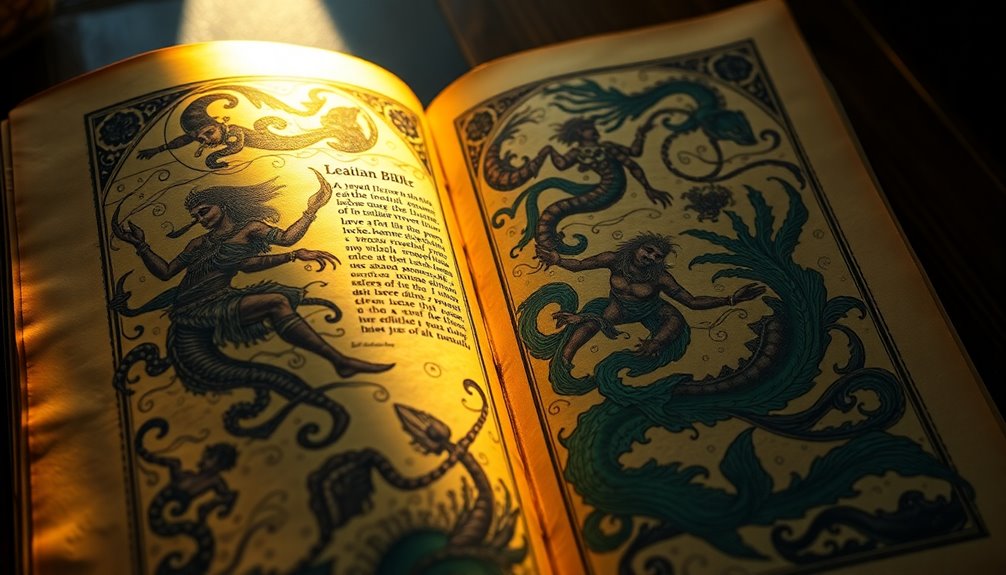
In the ancient Near East, cosmology was deeply intertwined with the understanding of chaos and order. You'd find that chaos was often personified by monstrous beings like Leviathan, symbolizing the chaotic forces that opposed divine order. This multi-headed serpent shares characteristics with mythological creatures such as Tiamat from Babylonian lore and Lotan from Canaanite traditions, both embodying chaos that needed to be vanquished.
The defeat of Leviathan and similar chaos monsters represents a significant theological theme: the establishment of cosmic stability. In these narratives, gods triumph over these chaotic entities, reflecting a deeper understanding of divine sovereignty and the necessity of order in the cosmos. Leviathan's imagery within biblical texts highlights this shared cultural perception of chaos, illustrating the ongoing struggle between order and disorder.
As you explore these ancient texts, you'll see how this portrayal of Leviathan aligns with the broader mythological narrative, emphasizing the act of taming chaotic waters. This struggle not only underscores the significance of divine intervention but also reveals the Ancient Near Eastern worldview, where the balance of chaos and order remains crucial for cosmic harmony.
Leviathan's Role in Chaos
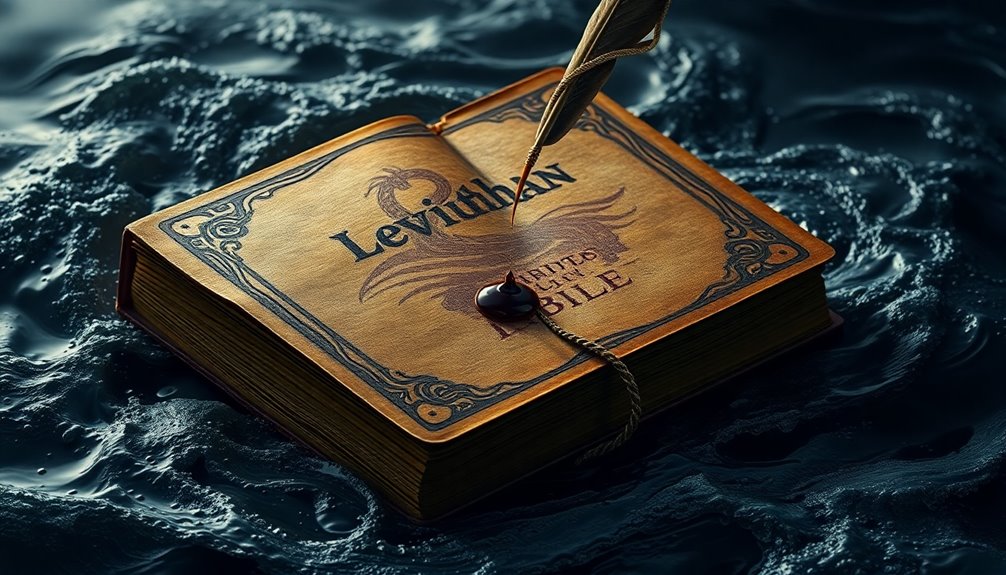
Leviathan embodies chaos in biblical literature, serving not just as a creature but as a powerful symbol of disorder that challenges divine authority. Its portrayal reveals a deep-rooted struggle between chaotic forces and God's sovereignty.
You see Leviathan as a malicious entity, often depicted as an untamable serpent in texts like Isaiah 27:1. This image emphasizes the theme of divine power triumphing over chaos, illustrating how God will ultimately subdue this formidable foe.
In the book of Job, the descriptions of Leviathan reinforce its fearsome presence, serving as a testament to chaos that defies human control. The creature's alignment with primordial chaos mirrors other ancient Near Eastern mythological beings, such as Tiamat, who embody similar themes of disorder. This parallel deepens your understanding of how chaos operates within these narratives.
Through Leviathan, you witness a recurring biblical theme: the confrontation between divine authority and chaotic forces. Each encounter underlines the assurance that, despite the untamable nature of chaos, divine power prevails, restoring order from disorder.
In this way, Leviathan stands as a potent symbol of the ongoing battle between chaos and divine sovereignty.
Leviathan's Nature Debated
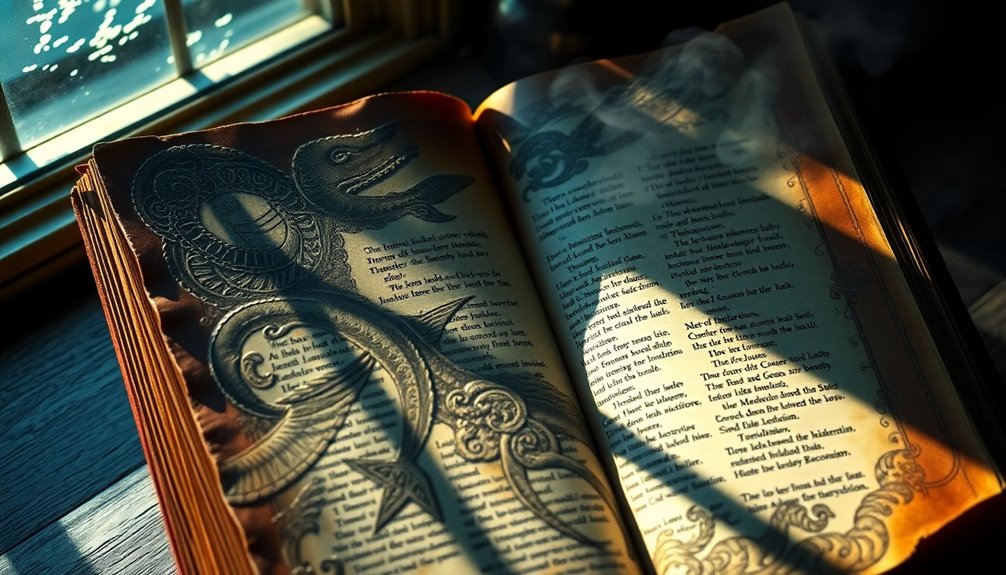
When you think about Leviathan, it's easy to get caught up in misconceptions.
Scholars argue whether it's a literal sea monster or a symbol of chaos, each interpretation shedding light on its complex nature.
You might even find yourself considering theories that link it to ancient mythological creatures, raising questions about what Leviathan truly represents.
Debunk Common Leviathan Misconceptions
Although many people envision Leviathan as merely a giant sea monster, the truth is far more complex. In biblical texts, particularly in Job 41, Leviathan embodies much more than an aquatic creature. Scholars debate its nature, with some suggesting it represents an actual animal, like a crocodile or a large sea reptile, while others argue it's a mythological entity symbolizing chaos and evil forces that oppose God.
Leviathan's depiction highlights its immense strength and untamability, which leads to various interpretations. Moreover, its multi-headed portrayal in Isaiah 27:1 connects it to ancient Near Eastern chaos monsters, moving beyond a simple zoological classification.
This association with chaos aligns Leviathan with other mythological creatures, such as the Canaanite Lotan and Mesopotamian Tiamat, reinforcing its symbolic role in ancient narratives.
Thus, when you think of Leviathan, remember that it serves as a rich symbol of chaos and divine power rather than just a monstrous sea creature. Understanding this complexity helps you appreciate the depth of its representation in biblical literature and its connections to broader mythological themes.
Interpretations of Leviathan's Nature
The complex nature of Leviathan invites a range of interpretations that extend beyond its portrayal as a mere sea creature. Often viewed as a symbol of chaos and evil in the biblical narrative, Leviathan embodies the formidable forces that God overcomes, as seen in passages like Isaiah 27:1 and Psalm 74:14.
Some interpretations suggest it represents an untamable creature, possibly a large sea reptile or dinosaur, described with fearsome traits in Job 41.
Leviathan's identity also connects to ancient Near Eastern mythology, paralleling the chaos monster Tiamat from Babylonian lore. This suggests a shared narrative theme of divine power triumphing over chaotic forces.
While some see Leviathan as a dragon or serpent, others interpret it as a representation of oppressive rulers or nations, particularly Babylon in the context of Isaiah.
In Jewish tradition, Leviathan gains further significance, anticipated to play a key role in eschatological events. The Talmud describes a grand meal involving Leviathan and Behemoth, highlighting its importance in cultural and religious narratives.
These diverse interpretations enrich our understanding of Leviathan's multifaceted nature.
Leviathan's Lessons for Resilience

When facing overwhelming challenges, you can draw strength from the lessons Leviathan teaches about resilience.
Embracing your inner power and leaning on your faith-driven community can help you navigate life's chaos.
These principles remind you that you're not alone in your struggles and that support is crucial for overcoming obstacles.
Embracing Inner Strength
In the depths of chaos, embracing your inner strength becomes essential for resilience. Just like the Leviathan, which thrives in turbulent waters, you can navigate life's challenges by tapping into your own powerful presence. This ancient creature's untamable nature serves as a reminder that within each of us lies the capacity to overcome adversity.
Leviathan's fierce characteristics symbolize the impenetrable armor you can cultivate through personal growth. When faced with overwhelming circumstances, remember that your inner strength is a form of divine strength, a resource you can rely on during tough times. Embracing this power allows you to confront your fears, turning chaos into a stepping stone for development.
As you reflect on the biblical narrative of God asserting control over Leviathan, let it inspire you to harness your own resilience. By acknowledging the challenges before you, you open the door to transformation.
Just as Leviathan embodies the struggle against chaos, so too can you emerge stronger, equipped with the inner strength necessary to thrive amidst life's storms. Embrace this journey of resilience, and witness how it shapes your character and fortitude.
Faith-Driven Community Support
Throughout history, communities have faced overwhelming challenges, much like the chaos represented by Leviathan. This formidable symbol reminds you of the importance of collective strength and resilience.
In times of hardship, engaging in faith-driven community support can mirror the divine power depicted in Leviathan narratives. By trusting in this higher authority, you foster a sense of belonging and unity among members navigating their own adversities.
When you collaborate with others, you confront fears and uncertainties together, paving the way for emotional growth. Each shared experience not only strengthens your bond but also empowers you to rise against overwhelming odds.
Just as God is portrayed as triumphant over chaos, your community can embody that same spirit of victory through collaboration.
Leviathan's lessons are applicable to modern community-building efforts. As you work together, you create a support system that nurtures resilience and encourages each member to thrive.
This faith-driven approach invites divine protection, fostering an environment where everyone feels valued and supported. Embrace the power of community support to navigate life's storms, drawing strength from one another as you face the chaos ahead.
Leviathan's Enduring Cultural Impact
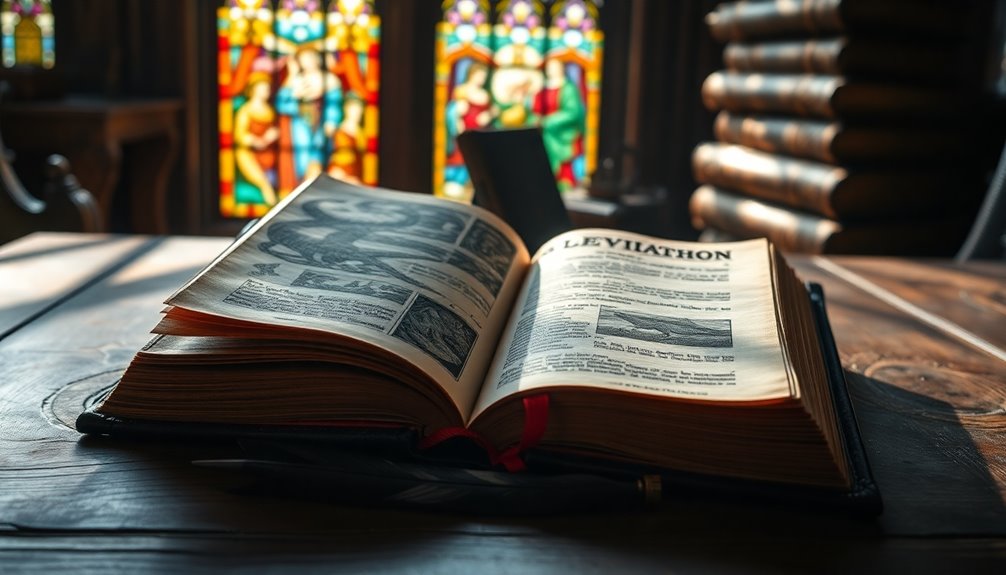
How has the figure of Leviathan woven itself into the fabric of our cultural narrative? This ancient creature, rooted in Near Eastern mythology, symbolizes chaos and power, embodying the overwhelming challenges you face in life.
Works like Herman Melville's "Moby-Dick" illustrate Leviathan's cultural impact, representing the struggle against insurmountable forces.
In modern contexts, Leviathan often serves as a metaphor for oppressive governance, reflecting society's rebellion against authority. The Church of Satan incorporates Leviathan as one of the Four Crown Princes of Hell, emphasizing its chaotic essence and connection to rebellion.
Its imagery resonates strongly in ecological discussions, where it symbolizes humanity's fraught relationship with nature and the fight against environmental degradation.
Scholars continue to examine Leviathan's role in ancient mythology, exploring its significance in cosmic battles between good and evil. This investigation shapes various theological interpretations, revealing how Leviathan has influenced religious thought and cultural expressions throughout history.
As you engage with these themes, you'll find Leviathan remains a potent symbol of chaos, power, and the ongoing struggle against both internal and external forces in our lives.
Additional Resources
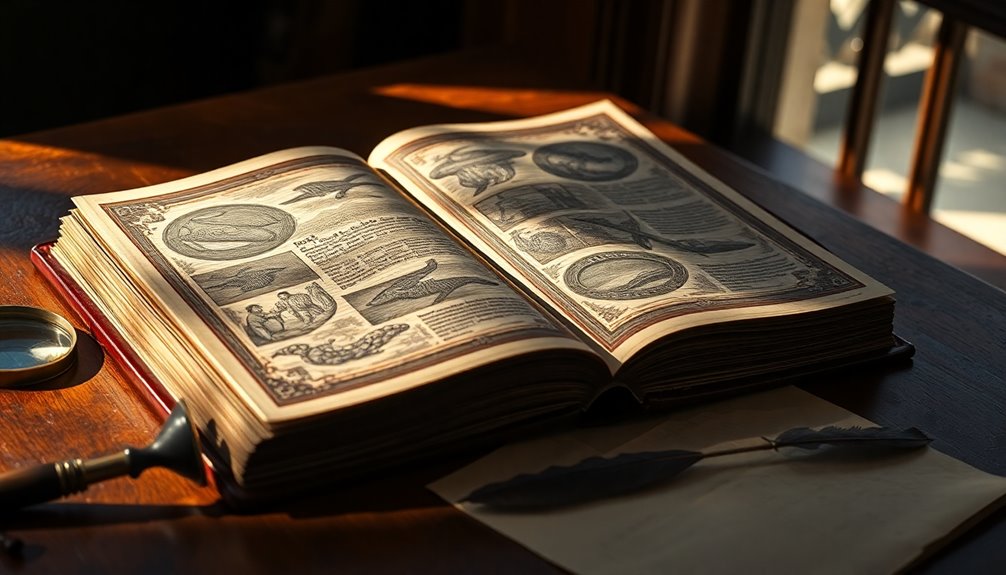
While exploring the rich symbolism of Leviathan, you'll find a wealth of resources that deepen your understanding of its cultural and mythological significance. Numerous scholarly works delve into Leviathan's roots in ancient Near Eastern mythology, comparing it to Canaanite and Mesopotamian figures like Lotan and Tiamat, which highlight its chaotic symbolism.
The Book of Enoch provides another layer, depicting Leviathan as a female monster in the abyss and shedding light on Jewish eschatological beliefs.
Interpretations in both Judaism and Christianity often view Leviathan as a representation of evil or chaos, with its defeat symbolizing God's authority over creation. In modern literature and popular culture, Leviathan frequently reappears, used to explore themes of power, authority, and environmental concerns. These resources illuminate how Leviathan remains relevant today.
Additionally, the Church of Satan recognizes Leviathan as one of the Four Crown Princes of Hell, embodying rebellion and chaos within its rituals.
Frequently Asked Questions
Why Did God Create the Leviathan?
God created the Leviathan to showcase His immense power and authority over chaos and nature.
By crafting such a formidable creature, He emphasizes that even the mightiest beings are ultimately under His control.
You can see Leviathan as a symbol of the chaos present in the world, reminding you that God is sovereign over all, capable of conquering even the most fearsome aspects of creation as part of His divine plan.
Is Leviathan Good or Evil in the Bible?
When you think about Leviathan, you see a creature that embodies both chaos and power.
It's often portrayed as an evil force opposing divine order, but there's more to it. You might notice it represents the tension between good and evil, illustrating God's ultimate control over creation.
How Many Leviathans Are There in the Bible?
When you explore the Bible, you'll find that Leviathan is mentioned six times in total. Each mention paints a vivid picture of this formidable creature, often symbolizing chaos and untamability.
You might notice that its characteristics vary across different texts, emphasizing themes of divine power and authority.
How Is the Leviathan Killed in the Bible?
In the Bible, the Leviathan is depicted as a powerful and chaotic creature. It's killed through divine intervention, showcasing God's ultimate authority over chaos.
In various passages, God crushes its heads and slays it, symbolizing His victory over evil. You see this imagery representing the struggle between divine power and chaotic forces, emphasizing that only God can conquer such formidable beings.
It's a testament to His strength and sovereignty in creation.










